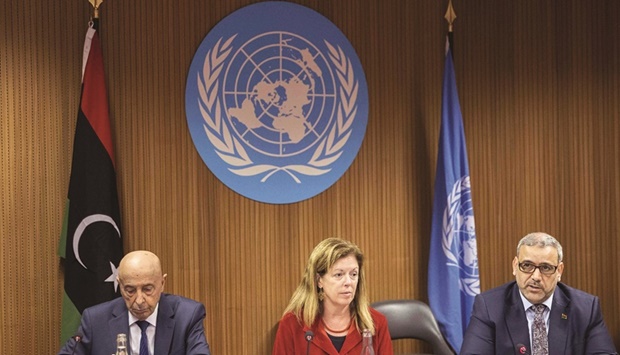The UN called for a “final and courageous effort” to break the deadlock over the rules for long-awaited elections in war-torn Libya, as talks between rival institutions began in Geneva.
Parliament speaker Aguila Saleh and President of the High Council of State Khaled al-Mishri are meeting at the UN’s Palais des Nations for two days of talks to discuss the draft constitutional framework for elections.
Presidential and parliamentary elections, originally set for December last year, were meant to cap a UN-led peace process following the end of the last major round of violence in 2020.
But the vote never took place due to several contentious candidacies and deep disagreements, over the polls’ legal basis, between rival power centres in the east and west of the country.
“Your presence here today is an example of responsible leadership,” the UN’s top Libya official Stephanie Williams said as she opened the talks.
“You have now reached a critical stage of what has been a long and difficult path.
“It is now the time to make a final and courageous effort to ensure that this historic compromise takes place, for the sake of Libya, the Libyan people and the credibility of its institutions.”
She said the two figureheads needed to find consensus on timelines, modalities and milestones to guarantee a clear path towards holding national elections as soon as possible.
A week of talks between the Tripoli-based High Council and Saleh’s eastern-based House of Representatives (HoR), aimed at agreeing on a constitutional basis for a vote, ended last Monday without a deal.
The prospect of elections appears as distant as ever since the HoR, elected in 2014, appointed a rival government to replace that of interim prime minister Abdulhamid Dbeibah, arguing that his mandate has expired.
After failing to enter Tripoli in an armed stand-off in May, the rival administration has taken up office further east in Sirte — hometown of former leader Muammar Gaddafi, whose overthrow in a Nato-backed revolt in 2011 plunged the country into years of often violent chaos.
HoR-backed premier Fathi Bashagha said last Wednesday in a letter to UN chief Antonio Guterres that he would “now be leading all efforts to bring elections to Libya at the earliest possible opportunity”. Recent weeks have seen repeated skirmishes between armed groups in Tripoli, prompting fears of a return to full-scale conflict.

(From left) Speaker of Libyan House of Representatives (HoR) Aguila Saleh, United Nations Special Adviser on Libya Stephanie Williams and President of Libya’s High State Council of State (HSC) Khaled al-Mishri give a press conference after a high-level meeting on Libya Constitutional track at the United Nations in Geneva, yesterday.
